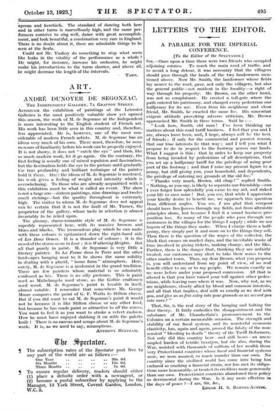LETTERS TO THE EDITOR.
A PARABLE FOR THE IMPERIAL CONFERENCE.
[To the Editor of' the SPECTATOR.] Sta,—Once upon a time there were two friends who occupied adjoining estates. To reach the main road of traffic, and to avoid a long detour, it was necessary that the villagers should pass through the lands of the two landowners men- tioned above. Now Mr. Smith, the landowner whose fields lay nearer to the road, gave, not only the villagers, but also the general public—not resident in the locality—a right of way through his property. Mr. Brown, on the other hand, was not so complaisant. He erected a toll-gate where the path entered his patrimony, and charged every pedestrian one halfpenny for its use. Even from his neighbour and close friend, Mr. Smith, he exacted the same fee. His sornesiliat exigent attitude provoking adverse criticism, Mr. Brown approached Mr. Smith in these terms. Said he :—
" Look here, Smith, old man ! I've been thinking up
matters about this road tariff business. I feel that you and I are, always have been, and, I hope, always will be the best of friends ; if only for the commercial and poorest reason, that our true interests lie that way ; and I tell you what I propose to do in :respect to the footway across our lands. What I suggest is this : that in order to keep our property from being invaded by pedestrians of all descriptions, that you set up a halfpenny tariff for the privilege of using your part of the footway ; and that I raise my present figure to a penny, but still giving you, your household, and dependents, the privilege of entering my grounds at the old fee."
"Thanks very much, Brown, old chap!" replied Smith.
"Nothing, as you say, is likely to separate our friendship—Can I ever forget how splendidly you came to my aid, and risked your life to save mine ! But, you see, that while I appreciate your kindly desire to benefit me, we approach this question from different angles. You see, I am glad that everyone should have free 'access through my fields, not from altruistic principles alone, but because I find it a sound business pro- position too. So many of the people who pass through are customers in the villages for the things I supply ; while we are buyers of the things they make. When I charge them a half- penny, they simply put it and more on to the things they sell. Then there is the question of the wages of the collector, the block that ensues on market days, and the inevitable waste of time involved in giving tickets, making change, and the like. Further, there is the danger that, thinking they are unfairly treated, our customers may elect to take their wares to the other market town. Thus, my dear Brown, what you propose is, you will understand from my point of view, of no real benefit either to me or to my people. We remain exactly as we were before under your proposed concession. All that is altered is that you have raised your toll against other pedes- trians, while leaving ours where it was. Now, why not, as we are neighbours, closely allied by blood and common interests, and all that that implies, deal with us exactly as we deal with you, and give us as free entry into your grounds as we accord you into ours ? "
That, Sir, is the real story of the banging and bolting the
door theory. It fairly embodies the disappointment and the substance of Mr. Chamberlain's pronouncement to the Colonies on a certain memorable occasion. The strength and stability of our fiscal system, and its wonderful economic elasticity, has, again and again, proved the falsity of the non- sensical "bleeding to death " theory of the Tariff Reformers. Not only did this country bear—and still bears—an unex- ampled burden of terrific. taxatjon, but she also, during the War, assisted with thousands of millions of her wealth those very Protectionist countries whose fiscal and financial systems were, we were assured, so much sounder than our own. No country since the civilized world has come into being has endured so crushing a financial strain, nor has met its obliga- tions more honourably, or treated its creditors more generously than our own. Protectionist countries abandoned their policy as detrimental (luring the War. Is it any more effective in the days of peace ?—I am, Sir, &c.,
EDGAR II. S. BARNES-AUSTIN.


























































 Previous page
Previous page